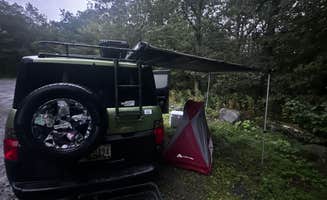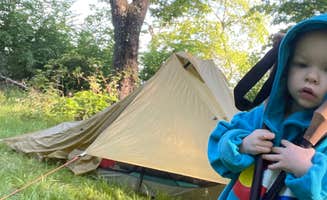Dispersed camping near Peckville, Pennsylvania centers mainly within the Pocono region, where elevations range from 1,400 to 1,800 feet. Weather conditions often include substantial rainfall throughout summer months, with temperatures typically 5-10 degrees cooler than nearby urban areas. Most primitive sites require complete self-sufficiency and overnight parking permits vary significantly between state forest and game lands.
What to do
Hiking extensive trail systems: The Thunder Swamp Trail provides over 26 miles of interconnected paths through diverse woodland habitats. According to one camper at Thunder Swamp Trailhead, "Trailhead parking was chill for a night. No trouble. Tons of hiking. Went down Saw Creek trail to a marsh."
Wildlife observation: Areas surrounding primitive campsites contain significant populations of deer, turkey, and songbirds. The wetlands accessible from several trails support amphibian species and waterfowl, particularly during spring migration periods.
Photography opportunities: Morning fog creates atmospheric conditions in low-lying areas throughout Russell Brook Road area, particularly from September through November. Seasonal lighting conditions typically peak between 7-9am during summer months.
What campers like
Quiet atmosphere: Most dispersed sites maintain significant distance from developed areas, reducing noise pollution. A camper at Hickok Brook noted, "Really is a nice quiet place. It's Labor Day weekend, see how many people try to cram in to the very limited camping area."
Natural settings: Sites generally offer unmodified surroundings with minimal human infrastructure. One visitor to Hickok Brook described it as "Beautiful but buggy lakeside tent sites," adding that it's "Very gorgeous but not rv friendly."
Flexibility for overnight stops: Several trailhead locations permit overnight parking for through-hikers or single-night stays. As one camper at Thunder Swamp Trailhead mentioned, "It's a gravel parking lot. Plenty of shade. No one bothered me."
What you should know
Permit requirements: Multiple dispersed camping areas require advance permits or registration with local ranger stations. According to a camper at Hickok Brook, "Where I originally camped was not a spot, according to Ranger. Had to move next to the lake. Need a permit on NY state land. Contact Rangers office of whatever county."
Limited facilities: Most sites lack basic amenities including potable water sources. A camper at Appalachian Trail Designated Backpacker Campsite 2 warned, "I gave the site only four stars because there's no water nearby, and the views are only mediocre."
Road conditions: Access routes to several sites feature challenging terrain unsuitable for standard passenger vehicles. A visitor to Hickok Brook cautioned, "The road is very rough with huge potholes so good clearance is a must. It's not a good spot for car camping but you could conceivably drive up to the spots and pull off the road to put up a small tent somewhere."
Fire regulations: Most dispersed sites in the region prohibit ground fires year-round. Campers must bring alternative cooking methods such as camp stoves.
Tips for camping with families
Wildlife safety measures: Some sites provide additional infrastructure for food storage. A camper at Appalachian Trail Designated Backpacker Campsite 2 noted, "We'll maintained w bear boxes provided. Good trees for hammocking."
Space considerations: Identify sites with adequate room for multiple tents when camping with children. Campsite size varies substantially between locations, with some offering limited flat terrain.
Water planning: No reliable water sources exist at most sites, requiring families to carry sufficient supplies. A camper at Russell Brook Road recommended calculating 1 gallon per person per day minimum, with additional during summer heat.
Weather preparedness: The region experiences rapid temperature changes, particularly during spring and fall. Pack layered clothing and rain gear regardless of forecast conditions.
Tips from RVers
Size limitations: Most dispersed camping areas cannot accommodate large recreational vehicles. A camper at Hickok Brook stated, "I drove in thinking that there would be flat places to park a very rugged camper in my full ton diesel pickup... Very gorgeous but not rv friendly."
Alternative options: RV campers should consider established campgrounds in neighboring areas, as primitive sites rarely provide suitable parking or turnaround space for larger vehicles.
Supply planning: With no hookups or services available, self-contained vehicles must arrive with full water tanks and empty waste tanks. The nearest dump stations require drives of 30+ minutes from most primitive camping areas.




